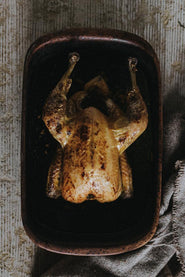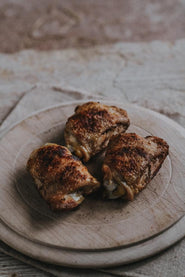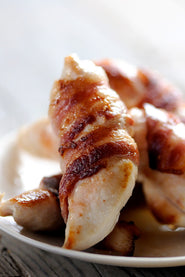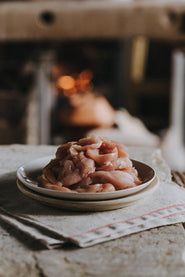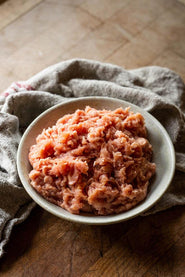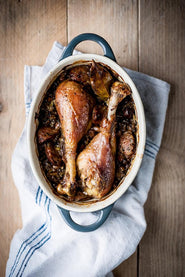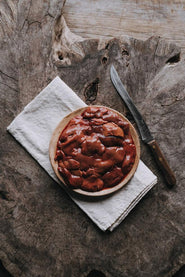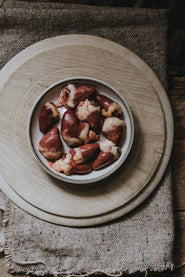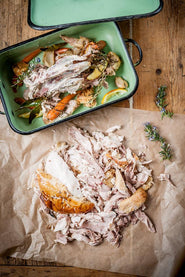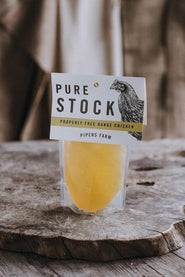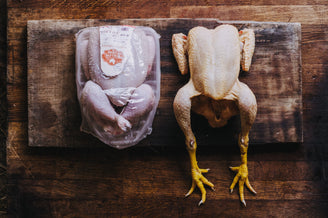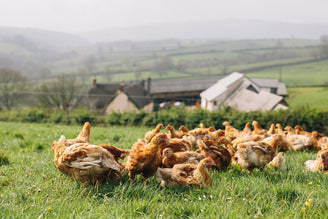In 2008 Peter Greig was involved in a controversial television programme alongside celebrity chef Jamie Oliver.
Jamie's Fowl Dinners highlighted the appalling conditions in which many of the UK's poultry live. The chef turned activist hoped to encourage supermarkets to invest in better-treated birds such as free range or organic.
In 2008 entire chickens could be bought for as little as £2.50, while figures from the RSPCA showed that only five percent of birds in Britain were kept in high welfare conditions.
In front of invited guests, Jamie showed a series of films and interviews explaining how the birds are killed and their brutal living conditions.
Behind the scenes, Peter helped to develop the content for the program alongside the channel 4 production team. Using his experience of growing industrial scale broiler chickens before converting to proper free-range farming, Peter was in charge of helping the team recreate an industrial production system and demonstrating the impact this had on the birds.
Shocked by the reality at one stage Jamie examined the 39-day life of a battery-reared chicken and said: "It's disgusting, the smell is awful. Why would anyone want to eat these birds, who are walking in their own faeces."
Oliver's aim was to get rid of the cheapest chicken meat.
"My ambition is to change the 95 percent of Britain eating standard chicken; to get them to step up to a better-welfare bird. I would say: buy British and buy the best welfare bird you can afford."
So Where Are We 10 Years On?
In 2012, 873.8 million broiler chickens were slaughtered for meat in the UK, producing 1.32 million tonnes of chicken meat. (Sources: Defra poultry slaughterings; Defra poultry meat production)
An estimated 72% of broiler chickens are reared intensively in the UK (around 630 million broiler chickens per year), 18% are raised in higher welfare indoor systems, 8% free range and 2% organic. (Source: The Meat Site, 2012)
A large European study found that on average: 57% of the fast-growing birds had severe walking problems.
Signs of Change?
While there is a lot more work to be done, over the last few months we have seen increasing signs of positive change within the industry with some of the countries most well-known brands pledging to make key improvements in their supply chain:
The first British retailer has signed up to new welfare measures for broiler chicken.
While on the flip side, until real change is made there continues to be scandal after scandal amongst those in charge of getting the majority of our chicken to our plates:
British supermarket chickens show record levels of antibiotic-resistant superbugs
Undercover in the chicken industry - Scandal 2 Sisters suspends chicken production
It’s still not good enough, promises were made 10 years ago and as consumers we should hold those promises to account. You can sign the petition and back the campaign here
Pipers Farm Properly Free Range Chicken
For 30 years we have had one mission, to produce food you can eat with complete confidence.
Nothing has had a stronger influence on the development of Pipers Farm than the way that Peter & Henri were producing chickens with his father in Kent 25 years ago, for one of the well-known High Street chains. Growing food that they were not prepared to feed to their young children.
As farmers, Peter and Henri were determined to do something about it. There is a world of difference between that industrial system in Kent and the Pipers Farm chickens of today.
Our chickens are grown by Holly and Chis in a properly free rage system just a few miles from Pipers Farm.
Our birds are all a slow-growing 'Hubbard' breed, hatched in Tedburn St Mary by our friends Sam and Felicity.
Our chicks start out in brooding sheds where they are kept warm under “electric hens”. These provide an environment which is as close as possible to being snug under their mother's wing.
At 3½ weeks old they are taken the short distance up onto the open pasture above the homestead. They are in groups of no more than 200 and they have shelter in tents by night and plenty of space to roam freely in the fresh hillside air by day. It is so important to us that they have plenty of exercise, running free and scratching and dust bathing whenever they want.
We only feed a simple cereal diet to supplement the grass they eat, so that they grow slowly and develop strong bones, real leg muscles and a texture which is so different from the ones grown back in Kent.
At 12 weeks old we kill each bird individually by hand on the farm so there is never any need to travel.
Our properly free-range chickens are then dry-plucked and hung for 12 days uneviscerated.
Our system of growing chicken in this day and age is incredibly unique, based on traditional methods that had been used for decades - before campylobacter and before salmonella! We apply common-sense husbandry, traditional farming methods, the highest ethical standards and a respect for nature to produce chicken that we can eat with complete confidence.
Pipers Farm Properly Free Range Chicken from Pipers Farm on Vimeo.

